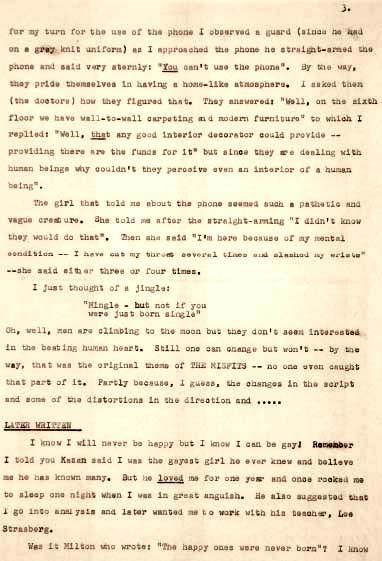Read Fragments: Poems, Intimate Notes, Letters Online
Authors: Marilyn Monroe
Fragments: Poems, Intimate Notes, Letters (18 page)

1961
From January 1960 onward, following the advice of Marianne Kris (her analyst in New York at that time), Marilyn started analysis with Dr. Ralph Greenson in Los Angeles. She wrote him a long letter on March 2 and 3, 1961, about three weeks after her disastrous confinement at Payne Whitney, when she had had to confront one of her worst fears: the specter of hereditary family madness, the fear of ending up in a psychiatric hospital like her mother and grandmother before her.
At the time, Marilyn had been transferred from Payne Whitney after Joe DiMaggio’s intercession and was convalescing at Columbia University’s Presbyterian Medical Center. She was reading Freud, especially his letters. Bed-bound, she wrote describing the details of her confinement and all the misunderstandings that had led to her being placed in isolation. We can imagine her distress as she faced the guardians of normalcy whom she felt were ready to condemn her irrevocably. We are almost surprised at the moderate tone she used when discussing Dr. Kris’s involvement, and the sense of perspective she had when recalling a scene in
Don’t Bother to Knock
(directed by Roy Baker in 1952) that inspired her rebellion against the commitment and her (sham) suicide threat. We can find, too, in this poignant letter, the characteristic way Marilyn would suddenly change the subject to something positive in order to put her fears to one side: here her reconciliation with Joe DiMaggio, which had happened at Christmas.


Note: May Reis was Marilyn’s personal assistant from the mid-1950s onward.







Marilyn with Edith Sitwell, London, 1956
Marilyn with Carl Sandburg, Los Angeles, 1961


WRITTEN ANSWERS TO AN INTERVIEW

1962
Whereas Marilyn often established bonds of trust and complicity with photographers, she was much more on her guard with journalists. That was why she prepared for interviews and often insisted on seeing the questions beforehand. That was obviously the case here, where we can read short draft answers she wrote to about thirty questions (the first few are missing) to give herself a lead. She invoked the master-pupil aspect of her relationship with Arthur Miller, and her difficulty in being a member of a group. No wonder that among the people she admired we find Eleanor Roosevelt (who was to die soon after Marilyn in November 1962), who was famous for her early feminism and opposition to racism, and who headed the U.N. commission to draw up the Universal Declaration of Human Rights. No less surprising was Marilyn’s support for the Kennedy brothers, for their strength and youth and idealism. She also looked up to Carl Sandburg for his poetry, so sympathetic to the common man, as well as Greta Garbo, the other myth. A horrified vision of the H-bomb, support for all manner of persecuted people, a considered defense of psychoanalysis: the glamorous blonde was certainly no reactionary. From her reference to Payne Whitney (where she had been confined for five days in February 1961) and from the books that the photographer George Barris, one of the last to shoot her, states she was reading a few days before her death, we may judge that these notes were written in 1962.

